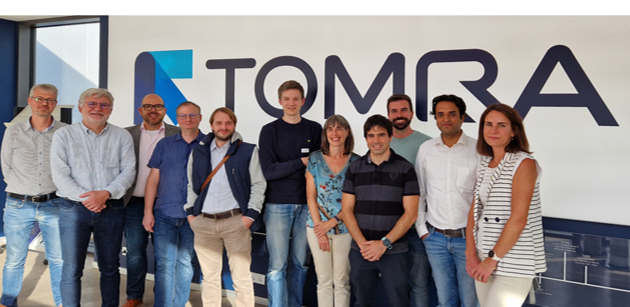On September 27th ant 28th the CAESAR project consortium celebrated the 3rd follow up meeting at the TOMRA Recycling (Tomra Sorting GmbH) facilities (Germany) to share the progress and results obtained to date.
One of the main topics discussed in the gathering focused on the pilot tests for conditioning low-quality ferrous scrap, using various technologies for shredding, cleaning and sorting with the aim of reducing the sterile content in order to increase the the percentage of those scrap grades in the scrap mix charged to the electric arc furnace and the converter.
AZTERLAN researchers Clara Delgado and Lucía Unamunzaga were among the attendees to the meeting which ended with a visit to the TOMRA test center where attendees had the opportunity to witness several scrap classification tests of various types using EM, XRT, color, optical and LIBS sensors.

CAESAR project follow up meeting at TOMRA Recycling facilities

CAESAR project follow up meeting at TOMRA Recycling facilities
CAESAR project is aimed at improving the quality of low quality scrap and to to this end, it is studying and optimizing processes for separating and eliminating impurities from this industrial waste, both through the development of new technologies and the updating of existing ones not currently applied for the recycling of ferrous scrap.
The CAESAR project consortium is participated by Centre de Recherches Métallurgiques, ArcelorMittal Basque Country Research Centre, ArcelorMittal Maizières Research, Rolanfer Recyclage, Reydesa Recycling, INATEC, SICON GmbH, ArcelorMittal Belgium, AZTERLAN Metallurgy Research Centre, Katholieke Universiteit Leuven, ArcelorMittal Sestao and ArcelorMittal France. The project is funded by Horizon Europe programme of the EU under Grant Agreement 101058520.

